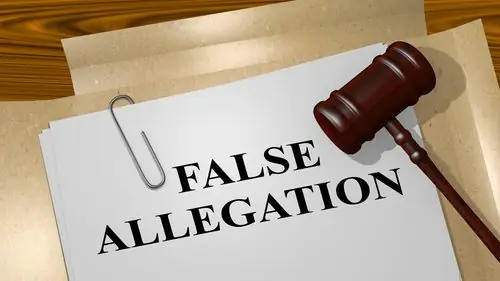Allahabad High Court imposes ₹10k costs on woman who filed false rape case against man and later married him
The Court said that the rising trend of women filing false rape cases against men must be addressed sternly. The Allahabad High Court recently quashed a rape case filed by a woman against a man after noting that the first information report (FIR) lodged by her was false and that they have married each other and were leading a happy life [Shivam Kumar Pal v State & Ors] The Court also imposed costs of ₹10,000 on the woman while quashing the case and said that the rising trend of women filing false rape cases against men must be addressed sternly. “Since, the first informant has categorically admitted having filed a false and concocted first information report, she is liable to be saddled with heavy costs,” the Court said in an order passed on July 27. A Bench of Justice Anjani Kumar Mishra and Justice Vivek Kumar Singh said that criminal justice system cannot be used as…
Genuine cases of sexual offences are now exception; law is heavily biased against men: Allahabad High Court
The Court remarked that, since girls/women have upper hand when it comes to protection of law, they succeed easily in implicating a boy or man. The Allahabad High Court recently observed that genuine cases of sexual offences are now exception and prevailing trend primarily involves false allegations of rape [Vivek Kumar Maurya v State & Ors] The Court also observed that a significant number of cases are being brought where girls and women falsely lodge first information reports (FIRs) after engaging in a prolonged physical relationship with the accused in order to gain undue advantage. Single-judge Justice Siddharth observed that the law is heavily biased against men and courts should be cautious when dealing bail petitions in such matters. “The time has come that courts should be very cautious in considering such bail applications. The law is heavily biased against males. It is very easy to make any wild allegations in First Information…
Bombay High Court voices concern over rise in trend of women misusing Domestic Violence Act
Justice RM Joshi quashed proceedings against the in-laws of a woman, who were living at distant places but were named in the complaint against her husband, mother-in-law, brother-in-law and other distant relatives. The Bombay High Court recently voiced its concern over the trend of estranged wives misusing the provisions of the Protection of Women from Domestic Violence Act to harass their husband and his family members including distant relatives (DV Act) [Dhananjay Mohan Zombade vs Prachi Dhananjay Zombade]. Single-judge Justice RM Joshi quashed proceedings under the Act against a woman’s in-laws who, despite residing far away, were named by the woman in the complaint she lodged against her husband and other relatives. “Unfortunately, a trend seems to have been adopted and proceedings under Domestic Violence Act are filed at even distant place i.e. place where aggrieved person resides and not only husband and joint family members residing under one roof are made respondents…
Women in our society reluctant to disclose sexual assault to avoid social stigma: Calcutta High Court
The Court also noted that there may be numerous reasons for the rupture of the hymen of a lady and that it does not conclusively prove rape. However, it ultimately upheld the rape conviction in this case. The Calcutta High Court recently observed that women in our society are reluctant to disclose sexual assault publicly due to the fear of facing social stigma in future [Raja Ruidas v State] A Bench of Justice Debangsu Basak and Justice Md Shabbar Rashidi made the observation while upholding the conviction of a man for the rape of a 16-year-old girl. “We do agree with the views of the learned trial court that in our society, a lady especially a minor girl would feel shy in publicly disclosing a sexual assault upon her in order to avoid a future social stigma,” the bench said. In this case, the man (appellant) had earlier been found guilty and convicted by the trial court for…
NRI DIVORCE
Introduction Nonresident Indian is the full form of the term, and it speaks for itself. There is no direct definition of “NRI” under Indian law. The NRI, or nonresident Indian, in its broadest sense. A nonresident Indian is someone with an Indian passport who immigrates to another nation for work or studies. Divorce is not simple; when it comes to NRI divorce, it might become more difficult if one of the parties does not reside in India. In this article, we discuss the divorce options available to NRI couples. Reasons that lead to NRI Divorce 1. The NRI husband is already married to another woman and may even have children who live with him abroad. Most of the time, the groom leaves the bride with her parents rather than taking her with him. But when the truth is out, the girl’s family asks for their daughter’s divorce. 2. The NRI…
WHAT IF MY EX-SPOUSE CANNOT AFFORD TO PAY CHILD SUPPORT
Child support aims to divide the costs of raising a child between the two parents. When child support payments stop, the parent living with the child may face serious financial difficulties. When support payments stop, the parent raising the child can have difficulty paying for the ordinary and every day expenses related to children of all ages. If your ex-spouse claims he or she cannot afford child support payments anymore, you may be wondering how to move forward and what kind of legal action you can take. Well, the first thing you need to do is determine if he or she is telling the truth. Your ex-spouse could be just lying in an effort to escape his or her parental and legal obligations. Unfortunately, there are life events which leave parents unable to pay child support. These life events include serious accidents, health problems or even a temporary loss of…
Bombay High Court questions CWC decision to give child up for adoption despite father claiming custody
The bench asked if the father had no rights once the mother abandoned the child. The CWC had rejected the father’s claim citing a case filed against him for having a relationship with the 17-year-old mother of the child. The Bombay High Court Wednesday rebuked a Child Welfare Committee (CWC) for giving up a child for adoption, despite the biological father seeking custody of the child. The CWC had earlier rejected the father’s claim of custody over the child as he was accused in a case filed against him for having a relationship with a 17-year-old girl, who was the mother of the child. The Court, however, took a dim view of the CWC’s conduct. “We don’t understand how CWC is conducting its cases. This is nothing but high-handedness by CWC. First, you (CWC) lose the papers and when we pull you up, you find the papers and then revoke the order. The child…
Inability of wife to bear child neither impotence nor ground for divorce under Hindu Marriage Act: Patna High Court
The Court held that, inability to bear a child is a natural aspect of married life, and couples can consider adoption or other alternatives for having children. Inability to conceive a child is neither considered impotence nor a valid reason for dissolving the marriage, the Patna High Court recently held. [Sonu Kumar v Rina Devi] The Hindu Marriage Act does not allow for divorce on the grounds of infertility, a bench of Justice Justice Jitendra Kumar and Justice PB Bajanthri underscored. Inability to bear a child is a natural aspect of married life, and couples can consider adoption or other alternatives for having children, the bench added. “Inability to bear a child is neither impotence nor any ground for dissolving the marriage. Such possibility of inability to bear a child may be part of marital life of anybody and parties to a marriage may resort to other means for having a child, such as, adoption.…
Amazed that Allahabad High Court rejected anticipatory bail but ordered ‘no coercive action’: Supreme Court
“The learned single-judge of the High Court while rejecting an application for anticipatory bail, in the same breath granted them protection for a period of two months,” the Supreme Court observed. The Supreme Court recently expressed surprise over an Allahabad High Court order that had granted interim protection to five accused men while rejecting their anticipatory bail pleas “in the same breath.” [State of Uttar Pradesh vs Mohd Afzal and ors] A bench of Justices BR Gavai and JB Pardiwala said it was ‘amazed’ at such proceedings and ‘self-contradictory’ verdicts. “We are amazed to see the order passed by the single-judge of the High Court of Judicature at Allahabad … The learned single-judge of the High Court while rejecting an application for anticipatory bail, in the same breath granted them protection for a period of two months. He directed that no coercive steps be taken against the respondent(s) for a period of two months. It…
Karnataka High Court overturns single-judge order allowing freedom fighters’ pension to 89-year-old widow
The Court found that a circular issued in 2014 by the Central government, which barred the sanction of freedom fighters’ pension after the death of the freedom fighter, was applicable in this case. The Karnataka High Court recently set aside a single-judge order directing State authorities to provide freedom fighters’ pension, along with all the arrears, to an 89-year-old widow. [State of Karnataka & Ors v Savantrewwa] A division bench of Justices R Devdas and Rajesh Rai K allowed an appeal preferred by the State authorities after noting that a circular issued by the Central government in 2014 applied to the present case. The said circular concerned the Central Government Sanman Pension Scheme. It provided that no person shall be sanctioned any pension in the name of a freedom fighter after his or her death, even if such person’s application was under examination at the time of death. The State government had also issued orders under…










